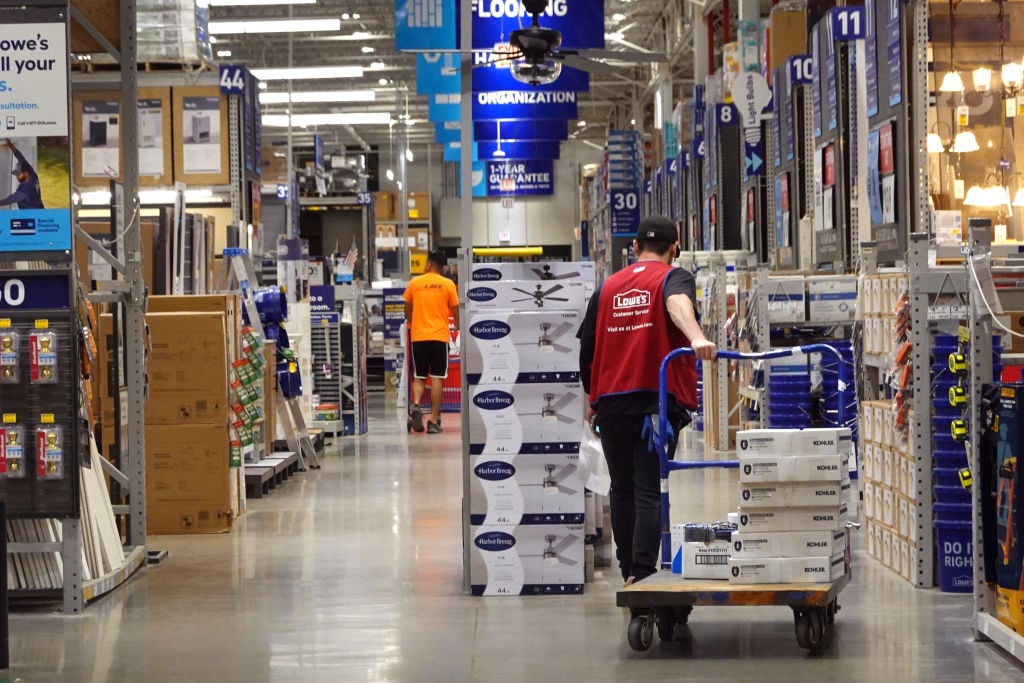Honest, paywall-free news is rare. Please support our boldly independent journalism with a donation of any size.
Ever get mad at a delivery person for bringing your pizza late? That used to be me. Now I assume it’s late because an overpaid boss is probably making two employees do the job of 10.
That’s because I worked for two years at a company with the kind of chronic understaffing that plagues many of America’s largest retailers and fast food corporations.
My job was to build merchandise displays at Lowe’s, the home improvement chain. I wasn’t supposed to deal directly with customers. But when people asked me for help, I was often the only employee available. So I wound up doing everything from sawing lumber to cutting keys — all the while worrying about finishing my assigned projects.
Such understaffing leads to frustration for customers and burnout for employees who have to hustle like mad for a paycheck that barely covers their bills. CEOs argue they just don’t have the money to hire more workers or pay family-supporting wages. But their actions say something else.
A new report by the Institute for Policy Studies shows that Lowe’s spent nearly $35 billion over the past three and a half years on stock buybacks. This is when a company takes money that could go towards worker wages or other productive investment and uses it to artificially inflate the value of their stock — and the value of their CEO’s stock-based pay.
In 2022 alone, Lowe’s spent $14.1 billion on buybacks. That would’ve been enough to give every one of the company’s 301,000 U.S. employees a $46,923 bonus. Instead, Lowe’s median worker pay was less than $30,000. And the CEO? He’s sitting on company stock worth about $108 million.
Other big retailers are not much different. Walmart, Home Depot, Target, Dollar General, and Best Buy all spent more than $5 billion on stock buybacks over the past few years.
CEOs say buybacks are a good way to return “excess cash” to shareholders. I’m pretty sure frontline workers could come up with far better ideas for investing those billions. But nobody’s asking them.
None of these big retailers are unionized, meaning their workers have no voice in major decisions affecting their lives.
That’s why a few co-workers and I started organizing at our Lowe’s store in New Orleans in 2022. We wanted to build collective power to address our challenges, including understaffing, unfair pay, and a lack of grievance protections. We were tired of seeing employees have no recourse after getting fired for showing up a few minutes late for reasons beyond their control, like a broken-down bus or a child care crisis.
Not surprisingly, the road to organizing the first big box store union has been bumpy. We’re proud that we overcame intense management opposition and gathered enough signatures on a petition to form a union. We also feel we helped pressure Lowe’s to give out some modest raises and bonuses.
But due to a technicality, we had to withdraw our petition. Then, a couple months ago, I was fired in what I believe was retaliation for my pro-union activities. The National Labor Relations Board has already ruled against Starbucks and Amazon for illegally firing union organizers. They are now investigating my firing and several other complaints about Lowe’s labor practices.
The deck is clearly stacked against ordinary workers at big powerful corporations. But we know that every employee contributes to the value of a company — not just the CEO. And we will keep fighting for the respect we deserve.
A terrifying moment. We appeal for your support.
In the last weeks, we have witnessed an authoritarian assault on communities in Minnesota and across the nation.
The need for truthful, grassroots reporting is urgent at this cataclysmic historical moment. Yet, Trump-aligned billionaires and other allies have taken over many legacy media outlets — the culmination of a decades-long campaign to place control of the narrative into the hands of the political right.
We refuse to let Trump’s blatant propaganda machine go unchecked. Untethered to corporate ownership or advertisers, Truthout remains fearless in our reporting and our determination to use journalism as a tool for justice.
But we need your help just to fund our basic expenses. Over 80 percent of Truthout’s funding comes from small individual donations from our community of readers, and over a third of our total budget is supported by recurring monthly donors.
Truthout’s fundraiser ended last night, and we fell just short of our goal. But your support still matters immensely. Whether you can make a small monthly donation or a larger one-time gift, Truthout only works with your help.
